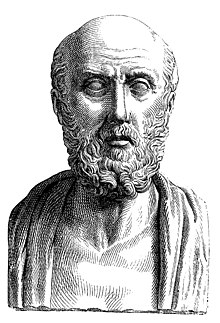Greek 460 BC - 370 BC
Born c. 460 BC Died c. 370 BC
(aged approximately 90)Larissa, Ancient GreeceOccupation Physician Era Classical Greece Hippocrates of Kos (/hɪˈpɒkrətiːz/; Greek: Ἱπποκράτης ὁ Κῷος, translit. Hippokrátēs ho Kôios; c. 460 – c. 370 BC), also known as Hippocrates II, was a Greek physician of the classical period who is considered one of the most outstanding figures in the history of medicine. He is traditionally referred to as the "Father of Medicine" in recognition of his lasting contributions to the field, such as the use of prognosis and clinical observation, the systematic categorization of diseases, or the formulation of humoral theory. The Hippocratic school of medicine revolutionized ancient Greek medicine, establishing it as a discipline distinct from other fields with which it had traditionally been associated (theurgy and philosophy), thus establishing medicine as a profession.[1][2]
However, the achievements of the writers of the Hippocratic Corpus, the practitioners of Hippocratic medicine, and the actions of Hippocrates himself were often conflated; thus very little is known about what Hippocrates actually thought, wrote, and did. Hippocrates is commonly portrayed as the paragon of the ancient physician and credited with coining the Hippocratic Oath, which is still relevant and in use today. He is also credited with greatly advancing the systematic study of clinical medicine, summing up the medical knowledge of previous schools, and prescribing practices for physicians through the Hippocratic Corpus and other works.[1][3]
Let food be thy medicine and medicine be thy food.
Cure sometimes, treat often, comfort always.
Wherever the art of medicine is loved, there is also a love of humanity.
Science is the father of knowledge, but opinion breeds ignorance.
A wise man should consider that health is the greatest of human blessings, and learn how by his own thought to derive benefit from his illnesses.
Life is short, the art long.
If we could give every individual the right amount of nourishment and exercise, not too little and not too much, we would have found the safest way to health.
There are in fact two things, science and opinion; the former begets knowledge, the latter ignorance.
Everything in excess is opposed to nature.
To do nothing is also a good remedy.
What medicines do not heal, the lance will; what the lance does not heal, fire will.
Healing is a matter of time, but it is sometimes also a matter of opportunity.
Make a habit of two things: to help; or at least to do no harm.
Walking is man's best medicine.
It is more important to know what sort of person has a disease than to know what sort of disease a person has.
Natural forces within us are the true healers of disease.
A physician without a knowledge of Astrology has no right to call himself a physician.
The life so short, the craft so long to learn.
Whenever a doctor cannot do good, he must be kept from doing harm.
It's far more important to know what person the disease has than what disease the person has.
The chief virtue that language can have is clearness, and nothing detracts from it so much as the use of unfamiliar words.
Extreme remedies are very appropriate for extreme diseases.
Prayer indeed is good, but while calling on the gods a man should himself lend a hand.
Many admire, few know.
Keep a watch also on the faults of the patients, which often make them lie about the taking of things prescribed.
Hippocrates





No comments:
Post a Comment